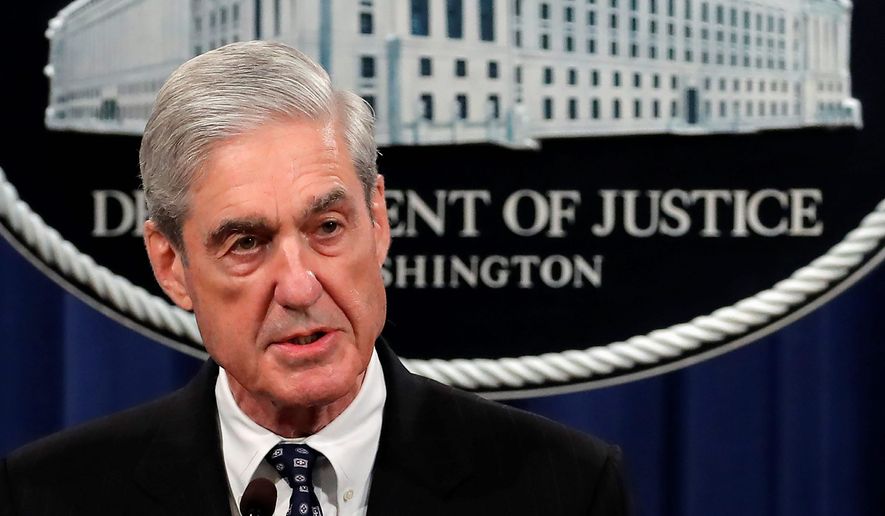Robert Mueller says his 448-page report is his testimony, but that’s not stopping lawmakers from signaling they will try to coax the former special counsel to break the “Mueller rule” when he arrives July 17 on Capitol Hill.
In just one example, Rep. Devin Nunes, California Republican, wants details on how the FBI probe into the Donald Trump campaign got started, Jack Langer, his spokesman, told The Washington Times.
“Republicans will focus on the many shortcomings, biases and false insinuations in the Mueller report and try to find out why Mueller refused to investigate the numerous abuses in how the Russia investigation was initiated and conducted,” Mr. Langer said.
Mr. Nunes is the ranking Republican on the House Permanent Select Committee on Intelligence.
After 22 months with the aid of 40 FBI agents, Mr. Mueller failed to find a Trump-Russia election meddling conspiracy as alleged by Democrats, Obama loyalists and media.
But some Democrats have not given up and want more information on Moscow-Trump ties.
Hope Hicks, President Trump’s former communications director, found herself answering the same questions on Russian contacts when she appeared June 19 before the House Judiciary Committee.
Some Democrats are looking to impeach Mr. Trump based on facts in the Mueller report’s Volume II section on possible obstruction of justice.
Rep. Adam B. Schiff, California Democrat and Congress’ most enthusiastic promoter of the Democratic Party-financed dossier, rejected the “Mueller rule” outright.
“There’s no limitation on confining his testimony to the four corners of the report,” Mr. Schiff, chairman of the House intelligence committee, told CNN. “That may be his desire, but Congress has questions that go beyond the report.”
Mr. Mueller never spoke during his tenure until May 29, his last day as special counsel, when he issued a terse statement and vowed not to speak again. Under Democratic subpoena, he reluctantly agreed last week to testify before the intelligence and Judiciary committees.
Mr. Schiff says the precedent was set by Attorney General William Barr, who has testified on his concerns about how the Obama administration opened the investigation in July 2016.
He appointed John Durham, the U.S. attorney for Connecticut, to set up shop in Washington to inquire how the FBI spied on Trump associates, relied on the opposition research dossier and obtained wiretap warrants.
Mr. Mueller’s report effectively demolished the dossier, which alleged a sweeping Trump-Russia conspiracy that the FBI didn’t find.
Mr. Schiff appears to want to counter the Barr effort by opening his own counterintelligence inquiry. He said he plans to summon not just Mr. Mueller, but also his staff of prosecutors for closed-door questions.
How Mr. Mueller assembled that team is sure to be a topic for Republicans. Mr. Trump referred to them as “18 angry Democrats.” Most prosecutors had Democratic ties, some as donors.
Andrew Weissmann, who handled the Paul Manafort investigation, donated to Democrats and attended what was supposed to be Hillary Clinton’s presidential victory party in New York. Jeannie Rhee represented Mrs. Clinton in two cases.
“We have legitimate questions about how all these people ended up on the Mueller team that had a history of donating financially to Democrats. There did not seem to be sufficient balance,” said Rep. Matt Gaetz, Florida Republican and a Judiciary Committee member.
Rep. Jim Jordan, Ohio Republican and another Judiciary Committee member, tweeted, “I’ve got a lot of questions about how Bob Mueller spent $35 million in taxpayer money to find there was no collusion.”
Republicans also want to know details about Mr. Mueller’s firing of two senior FBI employees — Assistant Director Peter Strzok and his lover, FBI counsel Lisa Page. The two exchanged loaded text messages filled with venom for candidate Trump, with Mr. Strzok pledging to “stop” him.
Mr. Strzok opened the investigation into the Trump campaign. Months later, he told Ms. Page in May 2017 that he might not join the Mueller operation because there was “no there there.” He ultimately did join.
He was dismissed after the Justice Department inspector general discovered the texts while reviewing how the FBI handled the Clinton email investigation. The FBI later fired him outright.
The House intelligence and Judiciary committees have somewhat different goals in questioning Mr. Mueller.
Judiciary Chairman Jerrold Nadler, New York Democrat, said he believes Mr. Trump obstructed justice.
Mr. Mueller said in Volume II that he could not come to that conclusion, but neither could he exonerate Mr. Trump. Mr. Barr then concluded that Mr. Trump didn’t obstruct justice, saying in part that there was no underlying crime.
Mr. Nadler, in a joint statement with Mr. Schiff, said: “Americans have demanded to hear directly from the special counsel so they can understand what he and his team examined, uncovered and determined about Russia’s attack on our democracy, the Trump campaign’s acceptance and use of that help and President Trump and his associates’ obstruction of the investigation into that attack.”
Mr. Mueller appears to have ruled out answering such questions, which Republicans say would be tantamount to writing a new report, in effect Volume III.
“Any testimony from this office would not go beyond our report,” Mr. Mueller said on May 29. “It contains our findings and analysis and the reasons for the decisions we made. We chose those words carefully, and the work speaks for itself. And the report is my testimony. I would not provide information beyond that which is already public in any appearance before Congress.”
• Rowan Scarborough can be reached at rscarborough@washingtontimes.com.




Please read our comment policy before commenting.